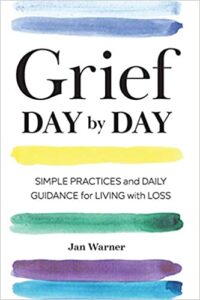Grief, Sleep, and Waking Up from the Daze
Guest Post by Camille Johnson
When my husband passed away unexpectedly, I went through all the classic 5 stages of grief: denial, anger, bargaining, depression, and acceptance. Even though my new normal is nothing like my old life, most days I feel like

I am on the right path. Helping others who are struggling with grief is part of how I cope. However, there is one thing that I still struggle with from time to time—sleep.
It’s no surprise that the Sleep Foundation concluded that the bereaved often have trouble sleeping. There are few situations in life more stressful than losing a loved one. The feelings of grief and anxiety that linger can often be masked during the day, when you have loved ones surrounding you and plenty of activity to keep your mind busy. But at night when things get still, your thoughts can run wild. You may lie awake and fixate on things you think you could have done to prevent the loss, or you may relive your loved one’s moment of passing over in your head.
Whatever the reasons for your wakefulness, know that in addition to compromising your sleep, a lack of sleep can affect life expectancy. This is why it’s crucial to get the sleep you need, especially during this difficult time. Fortunately, there are things you can do to get the rest you need to cope with your feelings. Thanks to Book Room Reviews, I can share my experience.
Exercise can help in overcoming grief
The more activity you do during the day, the more eager your body is to stay still at night. Try to get at least 30 minutes of exercise every day. If your schedule makes it difficult to get to the gym every day, take a walk outside. Even better, invest in some at-home workout equipment, such as dumbbells, which usually only cost a few dollars per pound.
Sleeplessness is worth paying attention to
We should get this out of the way first: if you’re having trouble sleeping, it’s an indication that something isn’t right, and getting back to normal may require more than a better mattress (you knew we were headed there, right?). Depression and anxiety can certainly throw sleep patterns out of whack. Even if you don’t know what may be wrong, even if you’ve never tried therapy, consider getting therapy online. You can save time and book an appointment that fits your schedule. High quality online care and support is available via computer or mobile device in the privacy of your own home.
Limit naps
A 15-minute catnap can help you recenter your thoughts and give you the energy to wrap up your day, but anything longer may throw you off in a couple of different ways. First, sleeping without finishing a full sleep cycle can make it harder to wake up and leave you feeling groggy. Second, taking naps late in the day may lead to a later bedtime, even if you have to wake up early.
Dress for sleep
Believe it or not, a brand-new pair of pajamas can make all the difference in the world. A warm bath before bed, a cup of herbal tea, and slipping into natural-fiber breathable fabric pajamas before slipping into the sheets feels elegant, but as a routine, the slow familiar pampering will send signals to your body to relax, with sleep on the way. Bamboo fabrics and wireless supportive bras for hard to fit sizes might be just the ticket to better sleep. Dressing for comfort can still be stylish during the day too.
Change your nighttime snacking routine

It’s not uncommon to grab a handful of chips or a bowl of milk and cereal before bed. After all, an empty belly can
rumble in the middle of the night and have you running toward the fridge. But try to steer clear of foods that will keep you up at night. Avoid ice cream, celery, chocolate, and alcohol. Try a quick cup of yogurt, a slice of cheese, or a handful of nuts as a bedtime snack.
Create a change of scenery
One of the best things you can do to trick your mind into settling down is very simple: rearrange your bedroom. If you’ve learned to associate your bedroom with negative feelings, it can be harder to settle in for the evening. If your lost loved one was your spouse or partner, rent a storage unit to put their stuff away for a few weeks or months.
Get a new mattress
A new mattress is an investment in your health. If the one you’re sleeping on is more than just a few years old, it’s time to start looking for a new sleep surface. Keep in mind, however, that certain mattress styles are better for different sleeping positions. You shouldn’t simply pick the mattress that’s on sale at the moment.
There are no changes you can make to your sleep schedule that will erase the feelings of grief. But sleep can help you cope and, for that reason, getting enough rest is essential to your overall well-being.
Visits: 46






